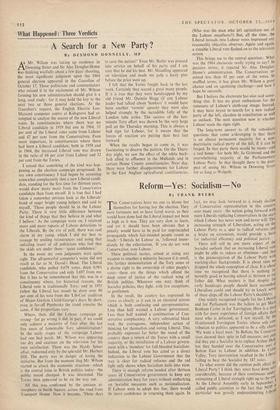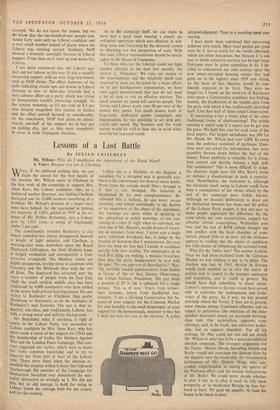Reform—Yes: Socialism No
By FRANK BYERS
TIlE Conservatives have no one to blame but themselves for having lost the election. They were fortunate not to have fared worse, as they would have done had the Liberal impact not been as high as it was. They are very slow to learn, and yet it should have been obvious that a penalty would have to be paid for unprincipled propaganda which fair-minded people resent so much—'Liberals let Labour in,' followed imme- diately by the exhortation, 'If you do not vote Conservative, vote Labour.'
These political tactics, aimed at using any weapon to smother a minority because it is small, this further demonstration of the Tory sense of a divine right to the ownership of other people's votes—these are the things which offend the deep sense of justice of the radical wing of British politics. Whatever one may think of Socialist policies, they fight, with few exceptions, as gentlemen.
In the result, the country has expressed its views as clearly as it can in an electoral system which is both confusing and unrepresentative. Less than half wanted a Labour government. Less than half wanted a continuation of Con- servative complacency. A very substantial block took the courageous, independent action of thinking for themselves and voting Liberal. This probably expresses far better the mood of the country than a return of the Tories with a small majority, or the installation of a Labour govern- ment with a `mandate' for full-blooded Socialism. Indeed, the Liberal vote has acted as a direct indication to the Labour Government that the way is clear for radical reforms and the red light only shows when Socialism hails into view.
There is enough reform needed after thirteen years of Conservative government to keep any administration busy for years without embarking on Socialist measures such as nationalisation. If Labour were to adopt this line, there would be more confidence in returning them again. In
fact, we may look forward to a steady deal of Conservative representation in this count over many years-----the nation going forward wi more Liberals replacing Conservatives in the sea which Labour has never won and never will. Th increasing strength of Liberalism, acting on 11 Labour Party as a spur to radical reforms at a brake on extremism, would provide a bas for industrial efficiency and political justice. There will still be one more aspect of the Socialist outlook that an increasing Liberal vote might be able to reduce or eliminate—and that is the preoccupation of the Labour Party with working-class backgrounds. It is about time v,e dropped the whole conception of class. It is about time we recognised that there is nothing or herently good in leaving school at thirteen as rt father did. What matters is that despite the early handicaps people should have succeeded, Liberalism could and should try to knock son e of these chips off the Labour Party's shoffiders. One widely recognised tragedy for the Liberals and for Parliament was the failure to get MO Bonham Carter in for Torrington. Here is a On with far more experience of foreign affairs than most who is defeated, as I saw myself, by d e ill-informed Torrington Tories, whose sole ear' tribution to politics appeared to be a silly chart' 'We want a local man.' In Bolton, the Consery tives showed their spite in full measure; not 011)r did they put a Socialist in to replace Arthur Hal, but they handed over the Conservative seat 0i Bolton East to Labour in addition. In Coll' Valley, Tory intervention resulted in the libel failing to beat the Socialist by 187 votes. To what extent did the opinion polls affect ti Liberal Party? I think they must havedone vet considerably, because of their continuous Linde estimating of Liberal strength right up to the At the Liberal Assembly early in September. called public attention to the fact that NOP particular was grossly underestimating Libel'
strength. We do not know the reason, but we do know that the one-hundred-seat sample con- tained forty seats with no Liberal candidate and a very small number, indeed of places where the Liberal was running second. Suddenly NOP showed a dramatic overnight increase in Liberal support. From then on it went up and down like a yo-yo.
I am quite convinced that the Liberal sup- port did not behave in this way. It was a steadily increasing support, with no very large last-minute rush as NOP claims. The effect, however, of the polls indicating erratic ups and downs in Liberal fortunes at two- or three-day intervals had a very adverse effect on a party which was trying to demonstrate steadily increasing strength. As the tension mounted, so 0.2 per cent or 0.3 per cent became magnified into success or failure and the effect overall harmed us considerably. At the conclusion, NOP had given us almost exactly one-half of the support we in fact got
, on polling day, just as they were completely in error in both Orpington elections. As to the campaign itself, we can claim to have had a good team running a closely co- ordinated operation which was effective in win- ning votes and frustrated by the electoral system in obtaining our due proportion of seats. With this vote, Liberal representation should be nearly eighty in the House of Commons.
To those who say the Liberals could not fight another election in the next few months, the answer is, `Nonsense.' We raise our money in the constituencies and the relatively small sum required by each can be raised by a major effort. As to our headquarters organisation, we have once again demonstrated that you do not need a lot of cash to run an effective election. The small amount we spend will surprise people. The Tories and Labour waste over 90 per cent of the money they spend. Too much money leads to large-scale, ineffective poster campaigns and organisations far too unwieldy to act with pre- cision and speed. Big business and the trade unions would do well to bear this in mind when next the hat is passed round.



































 Previous page
Previous page